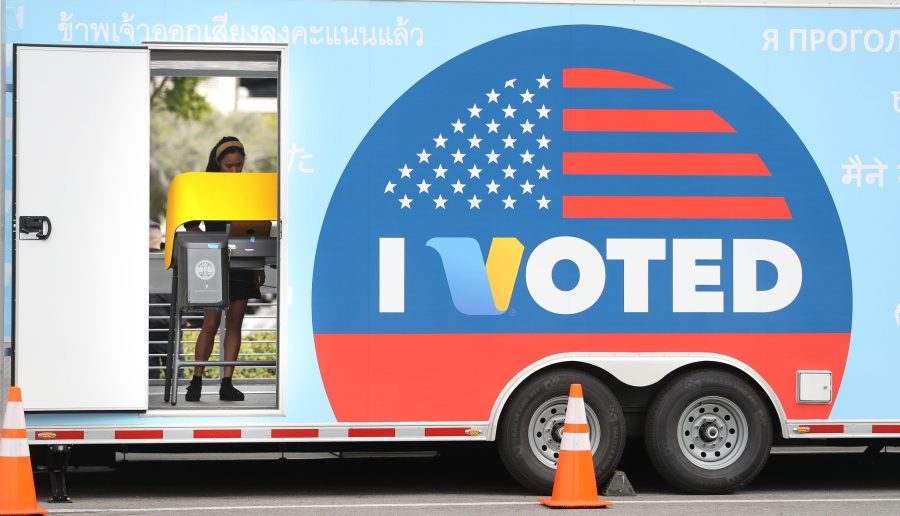Millions of Americans exercised their right to vote on Super Tuesday, which was held on March 3, 2020. 14 states and American Samoa held primaries and caucuses to elect party nominees for various positions ranging from school board members all the way up to the President. Over a third of the Democratic delegates were available to be claimed by the presidential nominees California and Texas have the largest number of delegates, with 415 and 228 respectively.
This was California’s first time participating in Super Tuesday. Traditionally, California’s primaries have been in June. However, in an attempt to make the California primary more influential for the rest of the country, former Governor Jerry Brown signed a bill in 2017 to move the primaries to March.
Presidential Primaries

Super Tuesday was one of the most important days for the upcoming 2020 Presidential Election. Former Vice President Joe Biden rose to the top of the Democratic field, winning in 10 states throughout the East Coast and the South. Senator Bernie Sanders won in four states, including California. As of March 8, Biden has secured himself with a total of 664 delegates and Sanders with 573.
The past week has been a successful week for Biden, as the democratic field has narrowed in his favor. Pete Buttigieg, Amy Klobuchar, and Mike Bloomberg have all dropped out of the race and endorsed Biden in an attempt to unify the moderate wing of the Democratic party. Elizabeth Warren — who ran on a more leftist platform like Sanders — dropped out of the race shortly after Super Tuesday on March 5 and has yet to endorse anyone.
While Biden and Sanders still have a long way ahead of them to reach the 1,991 Democratic delegates required to win the nomination, many democratic voters are beginning to take into consideration which candidate would be more “electable” against President Donald Trump.
Mayoral Race

The City of San Diego mayoral race narrowed down to two candidates for the November general election, with Todd Gloria winning 40 percent of the vote, followed by Republican Scott Sherman.
Gloria has served two terms on the city council, representing the 78th district in the California State Assembly since 2016, and worked as the interim mayor following Bob Filner’s resignation. If elected, San Diego would become the nation’s largest city to elect an openly gay man as mayor.
Sherman — who beat Democrat Barbara Bry for second place on Tuesday — has been a representative for Council District 7 since 2012 and previously owned a small insurance business.
Both Gloria and Sherman prioritize homelessness in their campaigns, offering solutions to end the homelessness crisis in San Diego. Gloria also focuses on battling climate change and investing in public transit. Sherman emphasizes providing affordable housing and public safety.
Proposition 13

Californians voted against Proposition 13, which would have provided $15 billion in bonds to California’s schools, including $2 billion for the UC system. The Proposition, which needed a simple majority to pass, lost with 56 percent voting against it.
Proposition 13 was the only statewide measure on the ballot this election cycle. The funds from the Proposition would have been used to renovate aging educational facilities throughout the state.
The Proposition was endorsed by a number of important figures, including Governor Gavin Newsom and the University of California Student Association to update buildings across all UC campuses to meet safety standards.
“The UC has a lot of buildings that need to be renovated, torn down and rebuilt, and retrofitted so that they can be safe. But they basically don’t have money to do it themselves.” UCSA President Varsha Sarveshwar said previously in an article by the UCSD Guardian.
The failure to pass Prop 13 marked the first time voters rejected an educational facilities bond in more than 20 years. Many local measures that would have given bonds to schools in Chula Vista, Cajon Valley, Lakeside, Poway, and Escondido Union School Districts also did not get enough votes to pass.
US Representative for 49th Congressional District

With only two candidates running for the 49th Congressional District’s representative seat, both Democratic incumbent Mike Levin and Republican challenger Bryan Marryott have moved on to the general election, with Levin winning 57 percent of the vote.
UC San Diego is part of CA-49, along with Carlsbad, Encinitas, Oceanside, Vista, and a small portion of Orange County. CA-49 recently switched from a Republican district to a Democratic one after the 2018 midterms with Levin’s win being viewed as a part of the nationwide “Blue Wave.”
According to Levin’s website, his platform is centered around environmental protection, preventing gun violence, equal treatment for the LGBTQ community, and advocating for better access to healthcare.
Maryott, who is a financial planner and a businessman, has focused his campaign’s attention on protecting the district’s beaches and environment, “making the border safer and secure for all,” tax reform to lower tax brackets, and controlling the national debt.
The November elections will be a tight race between Maryott and Levin and will determine whether CA-49 will remain a Democratic district or revert back to a Republican one.
Photo by Mario Tama for Getty Images.
Graphics by Alicia Gunawan for the UCSD Guardian.














